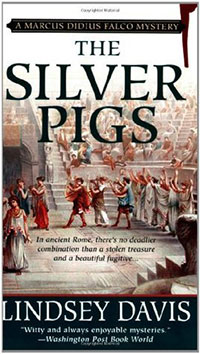
By Dennis Fischman
It’s quite a feat to write a historically accurate novel set in ancient times and make it as much fun as this one.
Marcus Didius Falco is an “informant,” or private investigator, working in first century Rome. He’s been described as “Roman Emperor Vespasian’s smart-aleck PI.” To keep body and soul together, Falco moves around Rome’s empire, working for hire, even in savage places like Roman Britain.

“The Silver Pigs” by Lindsey Davis. Minotaur Books, 2006, 329 pages.
Falco comes from a complicated family background: a scalawag of a father, a chiding mother, various sisters and brothers who are either trying to rise above their plebeian background and consider Falco a weight around their necks or who are amused by his antics (and call on his services when they need him).
In this debut, it is an aristocratic family who call upon him. At first, the mystery is the attempted kidnapping of a 16-year-old girl, Sosia, who becomes Falco’s client. As the book goes on, we find our way into tales of murder and intrigue at the highest levels of Rome, as well as a conspiracy to defraud the Roman government of quite a large amount of silver ingots from Britain. (The title of the book comes from this subplot, as “pigs” is another word for “ingots.”)
The cover story for Falco’s trip to Britain is to bring Sosia’s cousin Helena Justina home from that backwater part of the empire. That sets in motion the romance that will continue for decades. Davis puts the Rome in romance. Her Marcus Didius Falco is a cross between a noir detective and 007, while Helena Justina is a strong, smart, sexy, stubborn woman who refuses to let her sex or her social class dictate the shape of her life.
This book is really more of a political thriller than a whodunnit, and the process of finding out who’s conspiring against Vespasian makes more sense than the way our hero discovers the person who murdered his beloved’s cousin. Also, as a Jew, I could not help feeling aggrieved that the defeat of Judea and the destruction of the Second Temple were reduced to a mechanism for creating a chase scene. But that’s probably how the Romans were looking at it, at the time.
Do not expect anything deep from this series, but it promises a lot of enjoyable reading. If you like this first book, there are nineteen more to tickle your fancy.
Dennis Fischman is a member of the Somerville Public Library’s Mystery Book Club and an inveterate reader.















Reader Comments